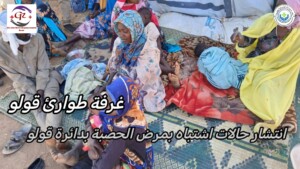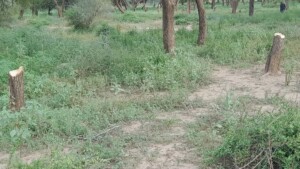Heavy rains and floods cause more disruption in Sudan
Heavy rains and floods continue to impact Sudanese all over the country. Yesterday, floods caused serious disruption in Khartoum and other states whilst El Gezira witnessed significant damage in the past days.
 Floods in El Gezira last year (RD)
Floods in El Gezira last year (RD)
Heavy rains and floods continue to impact Sudanese all over the country. Yesterday, floods caused serious disruption in Khartoum and other states whilst El Gezira witnessed significant damage in the past days.
Yesterday, heavy rains hit Khartoum and several other Sudanese states. The floods caused traffic jams in the capital but there have been no reports about casualties during yesterday’s floods so far.
According to the General Department of Health Emergencies and Epidemic Control in El Gezira, torrential rains recently led to the death of one person and the complete collapse of nine houses, 51 latrines, and two government offices, as well as the partial collapse of 141 houses.
The governor of El Gezira, Ismail Awadallah, called for the mobilisation of “all efforts to address the negative effects of the rainy season”.
In her report to the El Gezira Ministry of Health, Health Emergencies department employee Sawsan Abdallah explained that the displaced who fled the recent violence in Blue Nile state and are housed in Abubakar El Siddig camp for displaced, near the state capital Wad Madani, have received medical assistance.
The United Nations Office for the Coordination of Humanitarian Affairs (OCHA) reported yesterday that since the start of the rainy season in May an estimated 38,000 people have been affected by heavy rains and flooding across Sudan. “The rainy season usually lasts up to September, with the peak of rains and flooding observed between August and September”, they wrote.
Darfur
According to OCHA, at least 6 people died in Central Darfur and an unconfirmed number of people were injured when their houses collapsed due to the heavy rains or were washed away by the flash floods in the past weeks.
Last week, Radio Dabanga reported that the environmental conditions in El Fasher, capital of North Darfur, are deteriorating because ponds of rainwater surround public places and vital sites.
Residents of the city complained about the spread of mosquitoes and flies breeding due to stagnant water and called on the health authorities to do their part.
Last month, five-day-long torrential rains led to the collapse of more than 100 homes of predominantly Darfuri refugees in Kounongou camp in eastern Chad.











 and then
and then